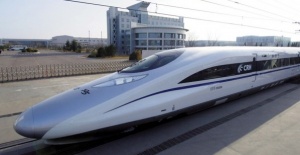China completes test of high-speed Beijing-Shanghai rail link

China has taken a major step in the roll out of high-speed rail with the completion of a test-run of the Beijing-Shanghai link, with the public launch set to take place this Thursday.
However a former top office has expressed concerns over the safety of the trains, which can travel up to 350km/h.
But He Huawu, chief engineer at China’s railway ministry, has rebuffed the claims, and is quoted by official Xinhua news agency as saying: “The claims of the former MOR (railway ministry) official are groundless.” China’s high-speed trains are “fast, comfortable and safe”, he added.
The new link will halve the journey time between the capital and the commercial hub to under five hours.
The project has also come under criticism for its high cost 215bn yuan ($33bn).
ADVERTISEMENT
China has invested heavily in its high-speed rail network, which reached 8,358 kilometres at the end of 2010 and is expected to exceed 13,000 kilometres by 2012 and 16,000 kilometres by 2020, with a further 700bn yuan earmarked to lay new tracks.
Critics say the government has invested too much money into high-speed lines, making the cost of tickets out of reach of most Chinese workers.
In response, the government has lowered ticket prices. Tickets range from 555 yuan for a second-class seat, to 1,750 yuan for business class.
He Huawu added: “Countries that are currently building high-speed railway can draw on the experience of China, such as its standards, construction ability and integration methods,” he said.
The public will be able to travel on the trains from Thursday, a day before the 90th anniversary of the Communist Party.
Beijing.City.Mobi and Shanghai.City.Mobi
To mark the new high-speed link, City.Mobi has launched its new guide to the two great cities.
Beijing.City.Mobi and Shanghai.City.Mobi become the latest in this illustrious line up of city guides, offering click to call functionality – which means no scribbling down telephone numbers.
City.Mobi offers the most comprehensive mobile travel guides available, with over 800 cities in 200 countries listed. Each is developed by the City.Mobi team to combine into a single global travel directory.
However, each city retains its own mobile identity via a dedicated domain. Already on offer are Brussels.Mobi, Paris.Mobi, Sanfrancisco.Mobi and Sydney.Mobi.
Most entries are also linked to websites where users can quickly access more detailed information if needed.
Other key features include information on accommodation, restaurants, attractions, entertainment, nightlife, shopping, and transport.
City.Mobi guides include user reviews and traveller utilities such as a translation guide, currency converter, news and local weather guide.

